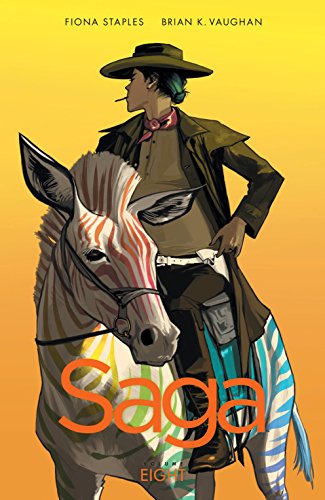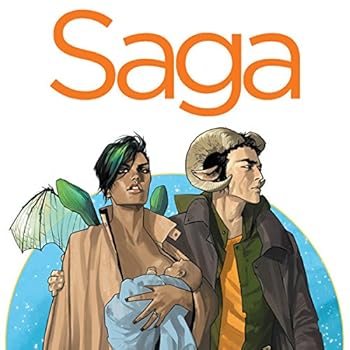![]() Saga (Vol 8) by Brian K Vaughan (writer) & Fiona Staples (artist)
Saga (Vol 8) by Brian K Vaughan (writer) & Fiona Staples (artist)
 It’s been six months since I read Vol 7 of SAGA, and after moving to London last summer we recently popped into Forbidden Planet in Soho, and that store is an absolute treasure trove of SF comics, books, and other fan goodies. There are so many enticing comics on offer there, you could spend your entire salary in one wild shopping spree. When I saw Vol 8 of SAGA with Wild West cover art among the new releases, I knew I had to have it.
It’s been six months since I read Vol 7 of SAGA, and after moving to London last summer we recently popped into Forbidden Planet in Soho, and that store is an absolute treasure trove of SF comics, books, and other fan goodies. There are so many enticing comics on offer there, you could spend your entire salary in one wild shopping spree. When I saw Vol 8 of SAGA with Wild West cover art among the new releases, I knew I had to have it.
SAGA is my favorite comic series, because it is always pushing the envelope in terms of content, themes, gorgeously assured and sometimes shocking artwork, and characters so charming, honest and flawed that you can’t help but cheer for them. If you like intelligent, snarky, sometimes profane space opera with a vast cast of star-crossed lovers, bounty-hunters, humanoid robots, tabloid reporters, terrifying monsters, and oddball creatures all caught up in a galactic war between the technology-based Wings and magic-wielding Horns of Wreath and Landfall, this series is guaranteed to captivate.
In Vol 8, Marko, Alana, Hazel, Prince Robot, and Petrichor find themselves on a remote Wild West planet. The traumatic events on planet Phang are still lingering, and they are in desperate need of an emergency medical procedure (any more details would be a spoiler). Once again writer Vaughan is unafraid to tackle a sensitive subject with the opening panel. And while I thought this time the story sometimes felt like it was purely a vehicle for political debate and hurt the story’s momentum, I applaud his willingness to put his characters in contentious moral situations. It’s a trademark of the entire series, love it or hate it.
While Petrichor encounters some Wild West outlaws, Alana, Marko, and Hazel hitch a ride on a train and meet up a very unexpected new character that quickly bonds with Hazel. In fact, Alana has discovered some surprising new powers that may be connected to this. Finally Alana and Marko reach their destination and the doctor they’ve been seeking. The dialogue sounds like something from a TV talk show debate, but then that’s what Vaughan wants to talk about, so that’s what we get. I thought this part of Vol 8 dragged, as the characters debate the merits of their actions. Likewise, Petrichor and Prince Robot are another odd partnership and have many arguments over gender, war, and politics.
I liked the story of Hazel and her new friend Kurti better. There were a number of poignant moments as they innocently discuss the world of adults, and this section will appeal to parents, siblings, and those aspiring to become one. Again, this part is very well-written and didn’t feel as forced as their earlier parts.
In the next chapter, we once again see what The Will has been up to, and he’s not in a good place. Seems that one of the many individuals he’s casually killed during his illustrious freelance bounty hunter career had a loved one who has tracked him down to exact revenge. This person has decided to really torture him by going through his old memories. We get to see some scenes from The Will’s childhood and early days as a bounty hunter with The Stalk. Artist Fiona Staples treats us to the ultra-violent action that the series generally features. I’m sometimes unsure if Vaughan & Staples show gruesome violence for the vicarious thrills, or as a technique to highlight that killing is not clean and anonymous like storm-troopers in Star Wars. Considering that his old sins are now catching up with The Will, I would hazard a guess its’ the latter. Eventually, his tormentor unearths a very valuable secret from his memories, though it’s no secret to readers.

In the final chapter, we rejoin Upsher, the gay tabloid journalist, Ghus the little prairie-dog warrior with a sense of justice, and the innocent young son of Prince Robot, Squire. They have an adventure in the forest, seeking the fearsome Dread Naught, and Ghus and the young robot have some interesting discussions about what situations justify fighting and killing to protect yourself. Vol 8 ends on an upbeat note, quite the opposite of the dark final panels of Vol 7.
Now that the series has reached 48 episodes and eight volumes, it has settled down to a more thoughtful pace, and while I think it does lack the intensity of the first four volumes and over-indulges in overt political themes that didn’t really carry the story forward much, I think Vaughan feels that he’s earned the loyalty of readers enough to be able to explore such themes with less propulsive action and more discourse. Again, I really appreciate that SAGA is not about escapism, its about our messy world, war, injustice, intolerance, innocence and cruelty, and most importantly the decisions we must make each day to get to the next day. That’s what keeps the series relevant and fresh – it’s real and funny and heartbreaking, often in rapid succession. Give it a try if you haven’t yet.
~Stuart Starosta
![]() By this point, if you’re not caught up on the preceding seven volumes of Brian K. Vaughan and Fiona Staples’s SAGA, then there’s no way you’ll be able to understand the gist of this. The planet Landfall (described as “a restless sci-fi wonderland”) and its moon Wreath (“a magical fantasy realm rooted in ancient tradition”) have been waging a generations-long war that has spread out across thousands of more planets in the galaxy.
By this point, if you’re not caught up on the preceding seven volumes of Brian K. Vaughan and Fiona Staples’s SAGA, then there’s no way you’ll be able to understand the gist of this. The planet Landfall (described as “a restless sci-fi wonderland”) and its moon Wreath (“a magical fantasy realm rooted in ancient tradition”) have been waging a generations-long war that has spread out across thousands of more planets in the galaxy.
The latest instalment of SAGA involves protagonists Alana, Marko and Hazel (two soldiers from opposing sides of the war and their hybrid daughter) dealing with a surprisingly mundane problem: a miscarriage. Given that their unborn son is causing considerable health problems for Alana, the family jettison to a backwater planet where discreet abortion clinics might be able to help. They’re joined by Prince Robot IV, a television-headed organic android who just wants to return to his only son, and Petrichor, an escaped transgender prisoner who only begrudgingly helps out the peace-loving nuclear family she’s fallen in with.

This volume also catches us up on The Will (a bounty hunter who was originally sent after Alana and Marko) who is currently being held captive by the fiancée of one of his past kills, and Squire (Prince Robot’s son) who is struggling to survive off the land as he awaits his father’s return.
The new setting gives Vaughan and Staples to explore their characters in a Wild West environment, complete with gunslingers, ranches, cowboy hats and cargo trains. It also explores themes such as life and death — specifically, life that never had a chance to properly begin. Due to the magical energies of her unborn child, the family members are confronted with a spectre of their son as he would have appeared had he lived, and all three are forced to grapple with his unexpected absence in their lives — before he even became a presence.
It’s haunting and thought-provoking, but naturally there are also plenty of wacky sci-fi elements as well. Like, for example, the black human male/white female centaur couple who have a mixed-race son; not just regarding his skin tone, but the fact he has a skeletal horse’s head as well as a regular human head and torso. Nothing is ever explicitly discussed concerning his genetics, but the implications are clear.
Any long-term fans of SAGA should be pretty pleased with what’s offered here: more exotic locales, more strange alien life-forms, and the on-going maturation of Hazel as she internalizes her experiences and relates them to the reader through her adult self’s narration.
~Rebecca Fisher




I can count on you to let me know when the next book comes out! I have a trip planned to my comic book store next week for ABBOT by Saladin Ahmed, and I’ll have to put Saga 8 on the list.
Yep, I love Saga so I jusy started reading Brian K Vaughan’s Paper Girls, which my friend swears by.
I meant to comment that I had really enjoyed Vol 1 and 2 of Papergirls… 3 left me scratching my head. I love the concept, though.